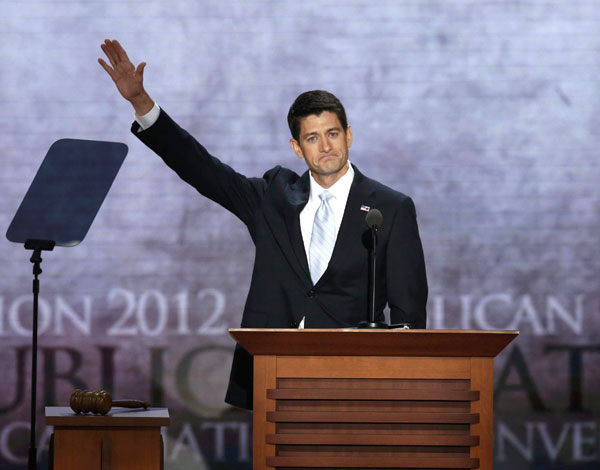Ryan accepts Republican VP nomination
 0 Comment(s)
0 Comment(s) Print
Print E-mail Xinhua, August 30, 2012
E-mail Xinhua, August 30, 2012
U.S. congressman Paul Ryan on Wednesday accepted the Republican Party's nomination as vice president contender, saying if elected, he and the Republican presidential nominee Mitt Romney will take responsibility in turning the country arround.
 |
|
Republican vice presidential nominee Rep. Paul Ryan waves after accepting the nomination during the third session of the Republican National Convention in Tampa, Florida, Aug 29, 2012. [Photo: Agencies via China Daily] |
Ryan accepted the nomination with a prime-time adress to the Republican National Convention.
"We will take responsibility," said Ryan, vowing to "reapply our founding principles."
"We have a plan for a stronger middle class, with the goal of generating 12 million new jobs over the next four years," said Ryan.
Unlike New Jersey Governor Chris Christie, whose keynote address Tuesday was criticized for not being centered on the party's nominee, Ryan spared no efforts in praising his running mate.
"Our nominee is sure ready. His whole life has prepared him for this moment -- to meet serious challenges in a serious way, without excuses and idle words," said Ryan. "After four years of getting the run-around, America needs a turnaround, and the man for the job is governor Mitt Romney."
Ryan is best known for his conservative views on budget and government spending. He led the development of Republican Party's House budget proposal Path to Prosperity, commonly known as the Ryan budget. He also proposed reforms to healthcare, a divisive issue in this election.
Ryan addressed the issue of healthcare in his speech, saying President Barack Obama's healthcare reform "comes to more than two thousand pages of rules, mandates, taxes, fees and fines that have no place in a free country." He urged voters to "elect Mitt Romney so that we can repeal Obamacare."
He continued to assail Obama by saying the president is funnelling money out of Medicare, saying a Romney/Ryan administration will strengthen Medicare and preserve it for the future generation.
The Ryan budget proposed drastic reforms to healthcare. It would give people under the age of 55 the option of receiving federal subsidies to purchase health insurance from private insurers when they become seniors, rather than relying on Medicare. It would also give block grants to states for health-care coverage of the poor, rather than having the federal government match every dollar the states spend on Medicaid.
Democrats have warned that Ryan's Medicare proposal would result in people being unable to afford health-insurance coverage as price increases, and would lead to the end of Medicaid.
According to a new poll released by Gallup on Wednesday, Americans have mixed views of Ryan, with 38 percent saying their opinion is favorable, and 36 percent saying it is unfavorable. About a quarter of Americans say they have never heard of Ryan or don't know enough about him to have an opinion.






Go to Forum >>0 Comment(s)